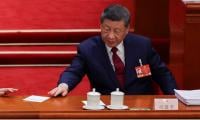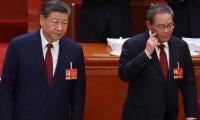Scanners soon at Punjab entry, exit points
Nawaz vows not to spare any effort to ensure peace in country, including Karachi;
directs expediting NAP’s implementation
LAHORE/ISLAMABAD: Scanners will soon be installed at the entry and exit points of Punjab to curb the smuggling of illegal weapons, Prime Minister Nawaz Sharif was told during a briefing on Saturday.
The move comes as the government decided to take tough action against extremism and militancy in Punjab as a part of which the geo-tagging of 14,000 madaris was already completed.
The prime minister was informed by Chief Minister Shahbaz Sharif and his team during a meeting at Raiwind that the process of geo-tagging and collecting information about all the mosques is in progress. The chiefs of banned outfits have also been arrested on the basis of the list prepared with the assistance of the army and intelligence agencies, they added.
Five hundred people, placed on the Fourth Schedule, were arrested and are now wearing electronic bracelets through which the Provincial Intelligence Centre is monitoring their movement. Apart from audit, the government has also collected the details of all the Madaris.
The prime minister directed to expedite the execution of the National Action Plan (NAP) and said every effort would be made to ensure peace in the country, including Karachi.
He said every hurdle in the ongoing operation against terrorists and their facilitators would be removed, while promising not to compromise on ensuring peace.
Nawaz said peace had been restored in Karachi through the targeted operation, adding that no one will be allowed to impede the process. Operation Zarb-e-Azb would continue till all the elements responsible for lawlessness were eliminated, he added.
The meeting was also attended by Interior Minister Chaudhry Nisar, Finance Minister Ishaq Dar, the Punjab home secretary, IG Police and heads of other agencies.
The chief minister said the financial audit of a madrasa run by PML-N lawmaker Hafiz Abdul Karim in Dera Ghazi Khan had also been conducted. The Provincial Intelligence Centre had been established with the help of intelligence agencies, where the personnel of the ISI, MI, IB and other organisations were working, he added.
According to the meeting’s details shared by senior sources in the PML-N with daily Jang, the geo-tagging of all the 14,000 Madaris in Punjab has been completed during the last year and they are being monitored from Lahore. The data collected about the Madaris includes land ownership, bank account details, financial audits, sources of funding and sects.
The chief minister told the prime minister that the province did not have the powers for registering Madaris as it was a federal subject but had all the necessary information. He said for the first time in the country’s history, geo-tagging of mosques was started last month in Punjab and would be completed soon.
The particulars of prayer leaders, sect and sources of financial/ other support are being collected. The Counter Terrorism Force has been expanded to the district level, while the provincial intelligence service is now so effective that even other intelligence organisations are taking its help.
Furthermore, around 1,000 biometric machines have been installed at police stations, which are connected to the interior ministry and Nadra. It would help in ascertaining the criminal record of any person and the details of Afghan refugees visiting police stations.
Wall-chalking promoting extremism and crimes related to the use of loudspeakers are now 0 per cent and 5 per cent respectively.
Action was taken over possessing illegal arms during the local government elections and even the PML-N office-bearers, chairmen and councillors were arrested.
During the meeting, the chief minister also briefed the prime minister on various development projects in rural and urban Punjab. Shahbaz shared details about the status of ongoing initiatives like clean drinking water, rural roads network and rehabilitation of the water supply system in the urban Punjab.
Nawaz appreciated the development projects carried out by the provincial government and expressed his satisfaction over the pace of development work. At the same time, he called for more efficient delivery of potable water as well as in the education and health sectors.
Nawaz also directed parliamentarians to contact the masses in their respective constituencies about their problems at the earliest.
-
 OpenAI Annualized Revenue Hits $25 Billion Milestone Amid Global Adoption Surge
OpenAI Annualized Revenue Hits $25 Billion Milestone Amid Global Adoption Surge -
 Billy Porter Claims He Came Back From The Dead Amid Sepsis Battle
Billy Porter Claims He Came Back From The Dead Amid Sepsis Battle -
 Harry Styles Hints He's Ready For Marriage And Family Life
Harry Styles Hints He's Ready For Marriage And Family Life -
 David Harbour’s Ex Faced Extreme Humiliation At Lily Allen’s Producer's Birthday Bash
David Harbour’s Ex Faced Extreme Humiliation At Lily Allen’s Producer's Birthday Bash -
 China Targets Tech Innovations Amid High Stakes Rivalry With US: Key Strategies Explained
China Targets Tech Innovations Amid High Stakes Rivalry With US: Key Strategies Explained -
 Pacers Vs Clippers: Kawhi Leonard Powers Clippers Past Pacers For Third Straight Win
Pacers Vs Clippers: Kawhi Leonard Powers Clippers Past Pacers For Third Straight Win -
 Scientists Build Tiny AI Brain Model Using Monkey Neurone Data
Scientists Build Tiny AI Brain Model Using Monkey Neurone Data -
 Oil And Gas Price Spike Might Lead Countries To Seek Alternative
Oil And Gas Price Spike Might Lead Countries To Seek Alternative -
 China Grapples With Slowest Economic Growth In Decades Amid Global Pressures
China Grapples With Slowest Economic Growth In Decades Amid Global Pressures -
 Jonathan Castagna Included In Flames’ Massive Trade That Sends MacKenzie Weegar To Utah
Jonathan Castagna Included In Flames’ Massive Trade That Sends MacKenzie Weegar To Utah -
 Marlon Wayans Drops Bombshell Statement About 'cancel Culture' Ahaed Of 'Scary Movie 6'
Marlon Wayans Drops Bombshell Statement About 'cancel Culture' Ahaed Of 'Scary Movie 6' -
 Steve Daines Will Not Seek Reelection As Trump Endorses Kurt Alme
Steve Daines Will Not Seek Reelection As Trump Endorses Kurt Alme -
 Khloe Kardashian Considering Having Third Child 'on Her Own'
Khloe Kardashian Considering Having Third Child 'on Her Own' -
 Nick Blankenburg Acquired By Avalanche From Predators In NHL Trade Deal
Nick Blankenburg Acquired By Avalanche From Predators In NHL Trade Deal -
 Cardi B’s Ex Steffon Diggs Faces Major Setback Post Breakup
Cardi B’s Ex Steffon Diggs Faces Major Setback Post Breakup -
 Hornets Vs Celtics: Charlotte Earns Sixth Straight Win In 118-89 Victory
Hornets Vs Celtics: Charlotte Earns Sixth Straight Win In 118-89 Victory



